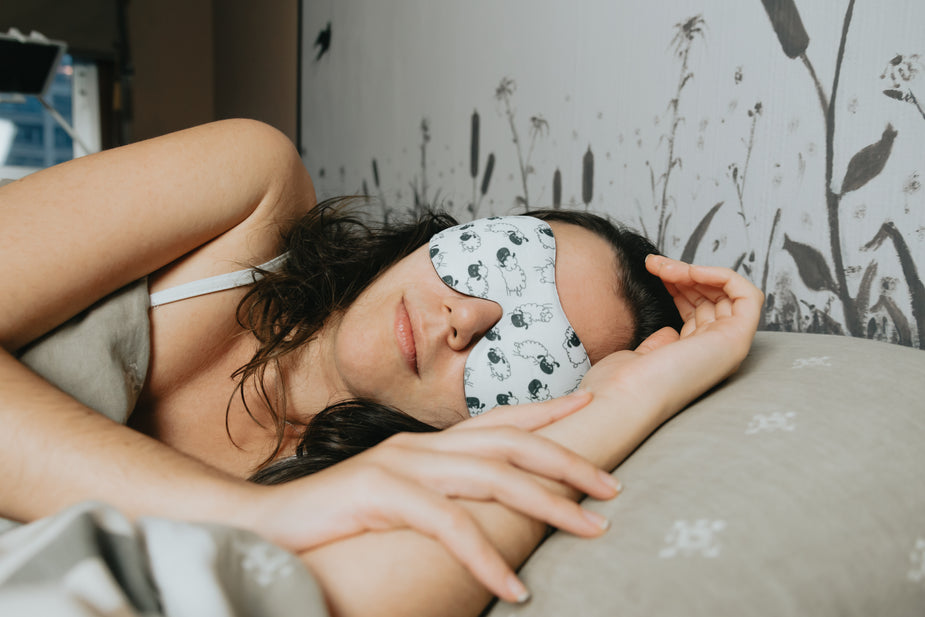Can You Sleep With a Tampon In? We'll Explain.

When it comes to sleeping with a tampon in, there are things that you need to think about. Your menstrual flow, how long you sleep, and what kind of protection you need, all decide whether it's safe for you to sleep with a tampon overnight.
Our Fluxies experts will go through the pros and cons of wearing tampons, and the factors involved in sleeping with a tampon in, so you can make an informed decision about whether this is something you want to do (and if so, how best to do it).
Is it safe to sleep with a tampon in?
Yes…depending on how much beauty sleep you plan on getting.
Most tampon manufacturers, and even the FDA (Food and Drug Administration), recommend you change your tampon every 4-8 hours, so the answer depends on how long you're planning to sleep for. The average person should aim to get at least 8 hours of sleep every night, especially during your period, to keep your energy up! If you are getting the recommended amount of sleep, you'll be using your tampon for too long, and you should think about other options.
If period pads make you feel uncomfortable, you can always use period underwear or a menstrual cup.
What can happen if I wear a tampon for too long?
If you wear a tampon for too long, several things can happen. The first and most serious is toxic shock syndrome (TSS). TSS is caused by the bacteria Staphylococcus aureus and Streptococcus pyogenes, which live in your body's nose, throat and skin.
When these bacteria come into contact with internal period products, like tampons, that are worn inside of you for an extended time, the toxins they produce can lead to life-threatening symptoms like fever, vomiting and diarrhoea. If left untreated, TSS can be fatal, so it's important to stick to the guidelines and change your tampon as recommended.
The NHS recommends getting help if you think you could have any symptoms of TSS, which include:
- Fever (temperature above 38C)
- Vomiting and diarrhoea
- Muscle aches and sore throat
- A sunburn-like rash across the face and body
- Rapid heartbeat and low blood pressure
- Confusion and extreme fatigue
You can read more about toxic shock syndrome here.
Other things that can happen if you leave a tampon in too long are:

How can I deal with a heavy period overnight?
If you're looking for a quick and easy solution for heavy periods overnight, you could try using a super absorbent pad, using a menstrual cup, doubling up on pads, sleeping on top of a towel, or using period underwear. Period underwear is designed to absorb blood flow during your menstrual cycle and Sleep Short styles are perfect for overnight protection.
If cramps are keeping you up at night, try using a hot water bottle before going to bed — the heat will help relax muscles in the pelvic area and reduce discomfort caused by cramping. If this doesn’t help, make sure to take some painkillers before you go to bed.
What alternatives are there to tampons?
If you're looking for something other than tampons, there are many alternative period products available, so you can be sure there's something out there to suit you. Some alternatives include:
Sanitary pads
These come in different absorbencies, so you can find something to suit your flow. The downside is that some people find disposable pads uncomfortable and they can’t be reused, making them bad for the environment and costly in the long run.
Reusable period pads
These can be a great alternative to tampons if you like using a pad, but you're looking for an eco-friendly reusable alternative. Our reusable period pads are super absorbent and thin, keeping you leak free for up to 12 hours. They can be reused for at least three years, saving you money and helping the environment.
Menstrual cup
This can be a good option if you are looking for an eco-friendly alternative to tampons, as they can be washed and reused for up to ten years. The downside is that it's not recommended to sleep with a menstrual cup.
Period pants
You can try period pants, which looks like normal underwear, but is made with layers of special materials that absorb blood and prevent leaks. They come in different styles, from Bikini to Boxer Short, so you can choose what's most comfortable for you.
Some people find them more convenient than pads or tampons, because they don't need to be changed as often, can go unnoticed as it’s just like wearing your normal underwear, and they can be washed and reused for three years.
These are some of the most popular alternatives to wearing tampons, but as always, it might take time to try different options out until you can stick with something that works best for you.
Still want to wear tampons overnight?
If you've decided wearing tampons overnight is something you want to do, here are our top tips for tampon safety:
Put the tampon in right before you go to bed
If you decide to wear a tampon overnight, make sure you put it in right before you go to sleep. This will reduce the time that you're wearing it.

Set an alarm
If you're planning to sleep more than 4-8 hours (the recommended amount of time for changing a tampon), setting an alarm could be a good idea. This will make sure that you keep up with changing your tampon regularly. If you think you might sleep through your alarm, or run over 4-8 hours, you might want to consider alternative overnight protection.
Wear extra protection
If you know your flow will be heavy overnight, it is a good idea to wear some form of extra protection. A pad or pantyliner could be a good option, but remember these will also need to be changed. You could always use period pants as extra protection as these do not need to be changed as often.
Make life easy and switch to fluxies period pants!
If you're not looking forward to setting an alarm and having to wear extra pads, why not switch to period pants? fluxies period underwear comes in different styles and absorbencies, including our Super Heavy range — perfect for overnight protection.
Our Heavy Flow and Super Heavy Flow ranges can be worn all night, just like regular underwear, but with no leaks. If you're wondering how period pants work, they have built-in layers of absorbent materials that lock in menstrual blood, so you don't need to worry about any leaks. There's also no need to worry about infections like toxic shock syndrome, as they are used externally rather than internally (like tampons or cups).
Take a look at our super absorbent Sleep Shorts if you're thinking of trying period underwear.
Our final thoughts
We hope this has been helpful when deciding whether to sleep with a tampon in. There are many things to consider, but luckily there are alternatives available, and you might be surprised by how much safer and more comfortable your period can be with a few simple changes.
Related Posts
What Is Toxic Shock Syndrome and Is It Linked To Tampons?
A Beginners Guide To Period Pants and Leak-Free Underwear
Why is My Period So Heavy? Causes and What You Can Do
How To Sleep Better On Your Period: 5 Proven Ways
Frequently Asked Questions
Q) How long can you sleep with a tampon in?
A) Most tampon manufacturers and health experts agree that you should change your tampon every 4-8 hours.
Q) Can you die from sleeping with a tampon in?
A) Leaving tampons inserted inside your body for too long can increase your risk of bacterial infections, such as toxic shock syndrome, which is rare, but can be deadly. If you have any symptoms of TSS, you should speak with a doctor.
Q) Is it ok to sleep with a tampon in?
A) This depends on how long you are planning to sleep with the tampon in. If you are sleeping longer than 4-8 hours with a tampon in, you should set alarms to wake up and change it.
Q) Are tampons safe?
A) Tampons are relatively safe when used correctly. There is a small chance of infections, like TSS, if worn for too long.



